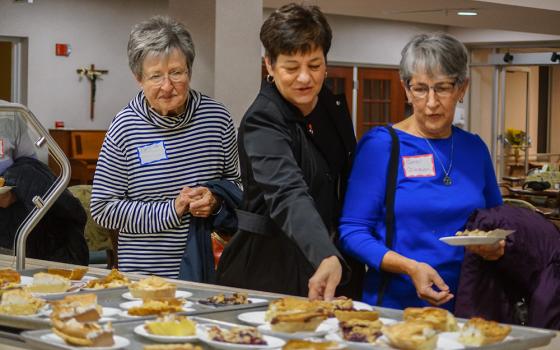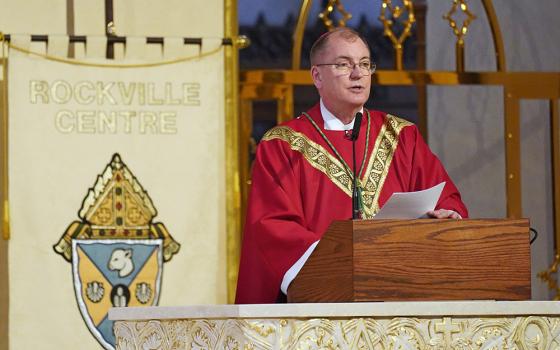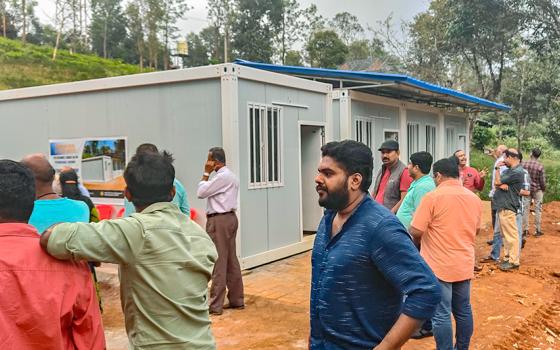A representative of the largest Christian community in the Middle East, the Orthodox Coptic church in Egypt, told the Synod of Bishops for the Middle East on Thursday on behalf of his boss, Coptic Pope Shenouda III, that the assembly “comes at a very late stage.”
For decades now, he said, the Christians of Egypt have felt the sting of “martyrdom, marginalization and the feeling of being ‘non-native’ citizens,” and many of their best and brightest have already fled.
t
The Egyptian Orthodox Church of Alexandria, better known as the Coptic Church in Egypt, claims roughly 15 million adherents, with 8-10 million in Egypt itself and the others living in other parts of North Africa and in a growing diaspora abroad. The Copts also have the distinction of being led by a pope – in this case, His Holiness Pope Shenouda III, Pope of Alexandria and Patriarch of Saint Mark Episcopate.
Like Christians in some other parts of the region, the Copts are fighting for survival. Last January, for example, six Copts and a security official were killed in a drive-by shooting after midnight Mass in Naj Hammadi, apparently in revenge for the alleged rape of a Muslim girl by a Christian man in the same town.
More broadly, Copts have long complained of harassment and discrimination, asserting that the police often turn a blind eye to attacks on the Coptic community. They also say Christians in Egypt suffer a sort of second-class citizenship, often frozen out of important political and economic positions.
Yesterday, a leading Middle East analyst in Washington, D.C., asserted that the Egyptian government of President Hosni Mubarak regime has facilitated what he termed "severe persecution" by Muslims of Egypt’s Christian minority.
Raymond Ibrahim, who lectures at the National Defense Intelligence College, said Egypt has transformed into the spearhead of the Muslim Brotherhood, which has intimidated the Coptic Christians.
“Indeed, recent events indicate that the Mubarak regime is intentionally inciting Egypt's Muslims against the Copts,” Ibrahim said.
Lebanese Jesuit Fr. Samir Khalil Samir, arguably Catholicism’s most astute interpreter of the Middle East, says that in Egypt “there is tension and conflict between Copts and Muslims everyday.”
Samir pointed to a recent media campaign in Egypt against Anba Bishoi, the patriarchal vicar, who reportedly said that the Christian Bible and Qur’ran are in basic harmony, and that differences are due to later additions to the Qur’an. Samir said the point was to emphasize what Christians and Muslims share, but it was spun in the press into a suggestion by a Christian prelate that the Qur’an is corrupt.
Today, a Coptic bishop in Italy presented a message to the Synod of Bishops for the Middle East on behalf of Pope Shenouda. The following is the full text of the bishop’s presentation.
MESSAGE OF THE EGYPTIAN COPTIC CHURCH
His Holiness Pope Shenouda III entrusted me with the mission to attend the Synod as his representative, and to express his warm gratitude to His Holiness for extending an invitation to partake in the Synodal works. He entrusted me with delivering a tribute of fraternal love to Your Holiness and to all the members of the Synod, in the name of our Lord Jesus Christ, praying and hoping that God will let the Synod bear its desired fruits for the good and consideration of the Christians of the Middle East.
Allow me to say that this Synod comes at a very late stage, as the conflicts and persecutions that our region suffers from have multiplied and turned into lamentation and suffering, resulting in the migration of a large number of the finest young Christians, leaving their homelands behind. I also mean leaving their hearts behind, with their history, authentic culture and tradition, in order to live and take refuge in another country, whose traditions and way of life are strange to them, not in line with their nature, but, compared to what they went through, still more secure and safer, providing them and their children with the hope of a better future.
The title of this Synod on communion and witness takes on a new meaning and significance with regard to the suffering and challenges faced by the Christians of the Middle East, due to precarious and complex political conflicts, particularly the Arab-Israeli conflict, as well as the wars this region has witnessed and still is enduring; wars that have caused an upsurge in Middle Eastern problems, where, as a reaction, anti-Jewish and anti-Christian Salafist movements alike were launched, while the spirit of hatred, rejection of the other and isolationism were felt on the other side in response to the psychological pressure and persecution. That, to the point of martyrdom, marginalization and the feeling of being “non-native” citizens enduring discrimination at work and in political institutions and parliamentary and local councils.
In this sense, it fell to the Church as a reality that it had to live and live with, particularly in how to minister to those communities that departed and scattered all over the world – in addition to ministering the remaining communities inside the country, encouraging them not to leave their homelands, and seeking to resolve their issues, as much as possible, through the intercession of officials.
From my personal experience, I can confirm that we were forced to undergo the reality of emigration. Nevertheless, the Coptic church realized the perils of emigration and migration, of leaving the country whatever the reason for the exile. Accordingly, with his keen intellect and spiritual sensitivity, Pope Shenouda III recognized the need of our Coptic migrant communities (around two million Christian Copts) residing overseas to live in the same ecclesiastic oriental spiritual environment they grew up and were raised in according to its traditions. That is why Pope Shenouda III sent the Church after its faithful communities, to look for them in fear of losing them and their Copt identity, as well as their disappearing in foreign communities.
Thus, he founded churches and monasteries and established Copt schools in immigration countries, such as:
In the United States: around 160 Egyptian Coptic churches, two monasteries and five bishops;
In Canada: 20 Coptic churches;
In Bolivia: several churches and a bishop;
In Brazil: several churches and a bishop as well;
In Australia: 20 Coptic churches, a monastery and three bishops;
In Europe: churches in almost every European country, three monasteries and three bishops;
In Sudan: two parishes, two monasteries and two bishops;
In Southern Africa: churches in Kenya, Zimbabwe and remaining countries – a monastery and two bishops.
He also founded Coptic schools in the United States, Canada and Australia.
I would like to affirm that we look forward to this Synod, thanks to the efforts of His Holiness and the Synod members. May it be the glimpse of hope that carries within it better solutions for the Christians’ problems in the Middle East. My thanks go to the Synodal members who succeeded, throughout their addresses, in covering all the aspects they have experienced and witnessed, dimensions that have had direct or indirect influences on emigration movements in the Middle East.




